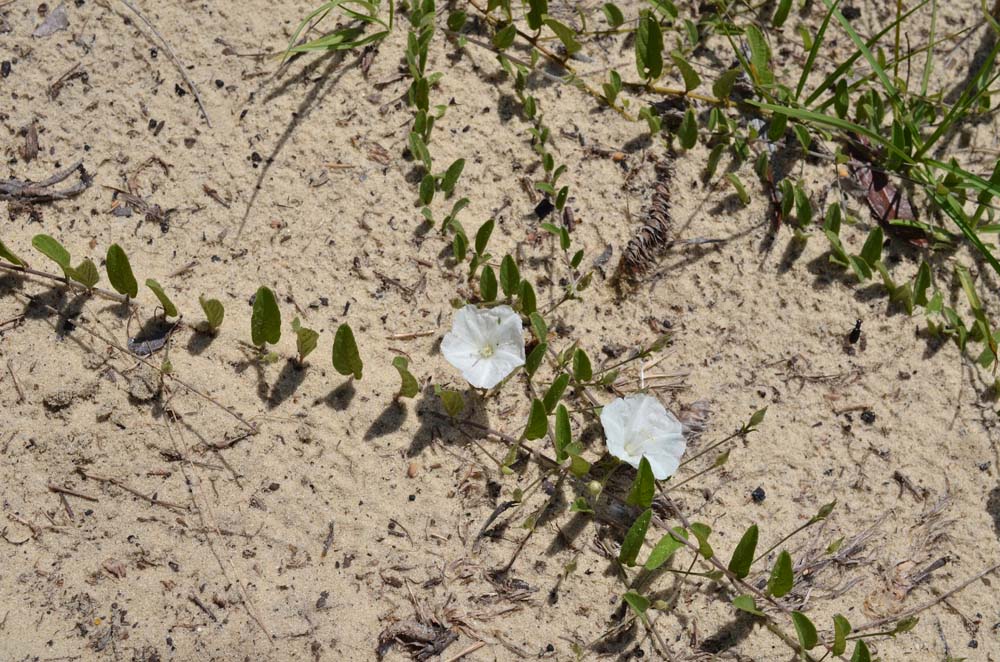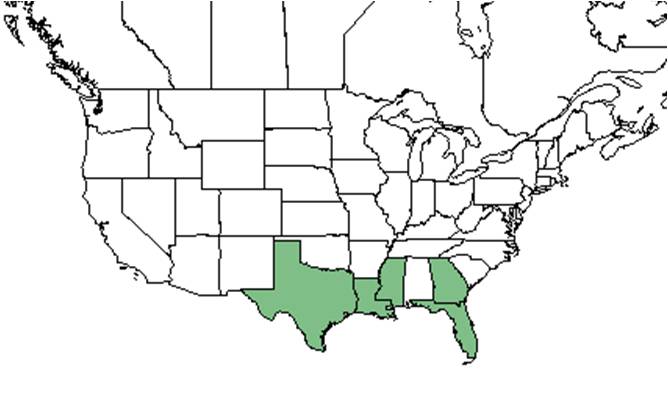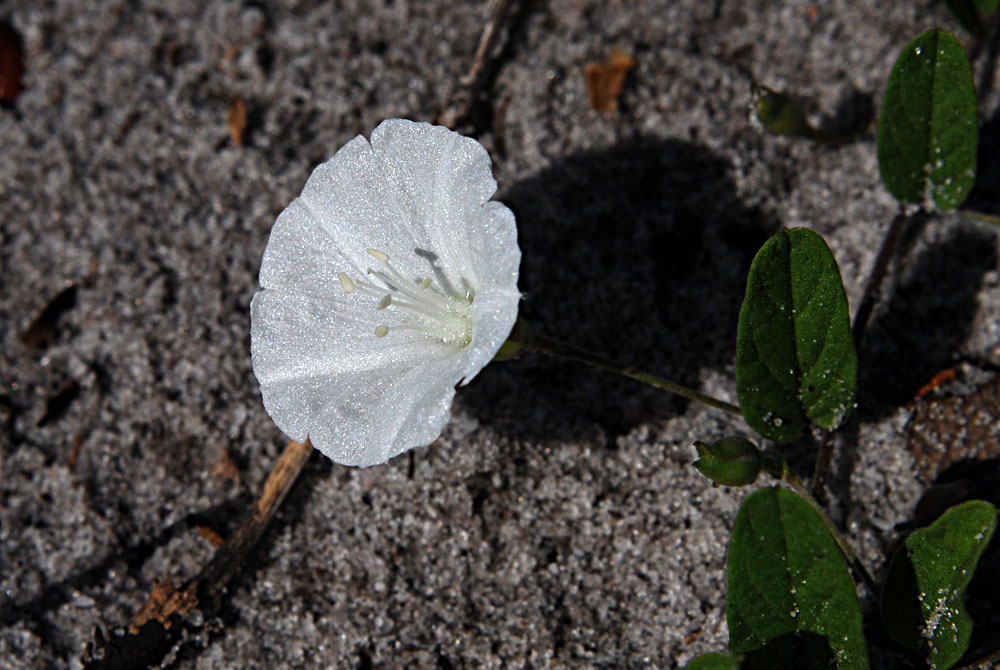Difference between revisions of "Stylisma villosa"
HaleighJoM (talk | contribs) (→Ecology) |
|||
| (37 intermediate revisions by 6 users not shown) | |||
| Line 3: | Line 3: | ||
{{taxobox | {{taxobox | ||
| name = Stylisma villosa | | name = Stylisma villosa | ||
| − | | image = | + | | image = Styl_vill.jpg |
| − | | image_caption = | + | | image_caption = Photo by Wayne Matchett, [http://www.spacecoastwildflowers.com SpaceCoastWildflowers.com] |
| regnum = Plantae | | regnum = Plantae | ||
| divisio = Magnoliophyta - Flowering plants | | divisio = Magnoliophyta - Flowering plants | ||
| Line 15: | Line 15: | ||
| binomial_authority = (Nash) House | | binomial_authority = (Nash) House | ||
| range_map = styl_vill_dist.jpg | | range_map = styl_vill_dist.jpg | ||
| − | | range_map_caption = Natural range of ''Stylisma villosa'' from USDA NRCS [http:// | + | | range_map_caption = Natural range of ''Stylisma villosa'' from USDA NRCS [http://plants.usda.gov/core/profile?symbol=STVI6 Plants Database]. |
}} | }} | ||
| − | Common name: | + | Common name: Hairy dawnflower |
| + | ==Taxonomic notes== | ||
| + | Synonyms: ''Bonamia villosa'' (Nash) K.A. Wilson; ''Breweria villosa'' Nash.<ref>Weakley, A.S. 2015. Flora of the southern and mid-atlantic states. Working Draf of 21 May 2015. University of North Carolina at Chapel Hill, Chapel Hill, North Carolina.</ref> | ||
| + | |||
==Description== | ==Description== | ||
<!-- Basic life history facts such as annual/perrenial, monoecious/dioecious, root morphology, seed type, etc. --> | <!-- Basic life history facts such as annual/perrenial, monoecious/dioecious, root morphology, seed type, etc. --> | ||
| + | ''S. villosa'' is a perennial vine that has wiry, twining, thick, pubescent stems. The leaves are alternate, elliptical/oval, densely covered with white hairs and are held upright at a right angle to the ground, which reduces water loss from transpiration during the heat of the day. Inflorescence are solitary or in cymes of 3-7 flowers.<ref name="hawthorn">[[http://hawthornhillwildflowers.blogspot.com/2012/11/hairy-dawnflower-stylisma-villosa.html]]Native Florida Wildflowers. Accessed: March 16, 2016.</ref><ref name="hoffman">Hoffman, S.J.. Taxonomic and phylogenetic evaluation of Stylisma (Convolvulaceae). Thesis: University of North Carolina Wilmington</ref> Flowers have white corollas and are about two centimeters broad.<ref name="fsu">Florida State University Robert K. Godfrey Herbarium database. URL: http://herbarium.bio.fsu.edu. Last accessed: November 2015. Collectors: Edwin L. Bridges, Robert K. Godfrey, Robert Kral, O. Lakela, Sidney McDaniel, J.B. McFarlin, Steve L. Orzell, Allen G. Shuey. States and Counties: Florida: DeSoto, Highlands, Martin, Palm Beach, Orange, Polk. Compiled by Tall Timbers Research Station and Land Conservancy.</ref> This species is commonly mistaken for ''S. aquatica'' when not flowering.<ref name="hoffman"/> | ||
==Distribution== | ==Distribution== | ||
| + | Found in Florida, Georgia, Mississippi, Louisiana, and Texas. Listed as vulnerable in Texas.<ref name="natureserve">[[http://explorer.natureserve.org/servlet/NatureServe?searchName=Stylisma+villosa]]NatureServe. Accessed: March 16, 2016</ref> | ||
| + | |||
==Ecology== | ==Ecology== | ||
===Habitat=== <!--Natural communities, human disturbed habitats, topography, hydrology, soils, light, fire regime requirements for removal of competition, etc.--> | ===Habitat=== <!--Natural communities, human disturbed habitats, topography, hydrology, soils, light, fire regime requirements for removal of competition, etc.--> | ||
| + | In the Coastal Plain in Florida, ''S. villosa'' habitats include longleaf pine/scrub oak sand ridges, moist lake shores, and sandy longleaf pine-scrub hickory-oak woods. It can be found in disturbed scrubs, hammocks and along canals through a burned wetland slash pine savanna. | ||
| + | |||
| + | Associated species include ''[[Quercus laevis]], [[Quercus incana]], [[Quercus virginiana]], [[Quercus myrtifolia]], [[Quercus chapmanii]], [[Serenoa repens]]'', and ''Ceanothus.''<ref name="fsu"/> | ||
===Phenology=== <!--Timing off flowering, fruiting, seed dispersal, and environmental triggers. Cite PanFlora website if appropriate: http://www.gilnelson.com/PanFlora/ --> | ===Phenology=== <!--Timing off flowering, fruiting, seed dispersal, and environmental triggers. Cite PanFlora website if appropriate: http://www.gilnelson.com/PanFlora/ --> | ||
| − | ===Seed dispersal=== | + | Flowers May through June and fruits June through November.<ref name="fsu"/> |
| − | ===Seed bank and germination=== | + | <!--===Seed dispersal===--> |
| + | <!--===Seed bank and germination===--> | ||
===Fire ecology=== <!--Fire tolerance, fire dependence, adaptive fire responses--> | ===Fire ecology=== <!--Fire tolerance, fire dependence, adaptive fire responses--> | ||
| + | Populations of ''Stylisma villosa'' have been known to persist through repeated annual burning,<ref>Platt, W.J., R. Carter, G. Nelson, W. Baker, S. Hermann, J. Kane, L. Anderson, M. Smith, K. Robertson. 2021. Unpublished species list of Wade Tract old-growth longleaf pine savanna, Thomasville, Georgia.</ref> and this species has been observed growing in burned wetland slash pine savannas.<ref name="fsu"/> | ||
===Pollination=== | ===Pollination=== | ||
| − | + | Leafcutting bees such as ''Dianthidium floridiense'' (family Megachilidae) were observed visiting flowers of ''Stylisma villosa'' at the Archbold Biological Station:<ref name="Deyrup 2015">Deyrup, M.A. and N.D. 2015. Database of observations of Hymenoptera visitations to flowers of plants on Archbold Biological Station, Florida, USA.</ref> | |
| + | <!--===Herbivory and toxicology===<!--Common herbivores, granivory, insect hosting, poisonous chemicals, allelopathy, etc--> | ||
| + | <!--===Diseases and parasites===--> | ||
| + | |||
| + | ==Conservation, cultivation, and restoration== | ||
| − | + | ==Cultural use== | |
| − | |||
| − | |||
| − | |||
| − | |||
==Photo Gallery== | ==Photo Gallery== | ||
| + | <gallery widths=180px> | ||
| + | File: Styl_vill_WMatchett_SpaceCoastWildfl-Flower.jpg | <center> Flowers of ''Stylisma'' ''villosa'' <p> Photo by Wayne Matchett, [http://www.spacecoastwildflowers.com SpaceCoastWildflowers.com] </p> | ||
| + | </gallery> | ||
==References and notes== | ==References and notes== | ||
| − | |||
Latest revision as of 18:17, 15 July 2022
| Stylisma villosa | |
|---|---|

| |
| Photo by Wayne Matchett, SpaceCoastWildflowers.com | |
| Scientific classification | |
| Kingdom: | Plantae |
| Division: | Magnoliophyta - Flowering plants |
| Class: | Magnoliopsida – Dicotyledons |
| Order: | Solanales |
| Family: | Convolvulaceae |
| Genus: | Stylisma |
| Species: | S. villosa |
| Binomial name | |
| Stylisma villosa (Nash) House | |

| |
| Natural range of Stylisma villosa from USDA NRCS Plants Database. | |
Common name: Hairy dawnflower
Contents
Taxonomic notes
Synonyms: Bonamia villosa (Nash) K.A. Wilson; Breweria villosa Nash.[1]
Description
S. villosa is a perennial vine that has wiry, twining, thick, pubescent stems. The leaves are alternate, elliptical/oval, densely covered with white hairs and are held upright at a right angle to the ground, which reduces water loss from transpiration during the heat of the day. Inflorescence are solitary or in cymes of 3-7 flowers.[2][3] Flowers have white corollas and are about two centimeters broad.[4] This species is commonly mistaken for S. aquatica when not flowering.[3]
Distribution
Found in Florida, Georgia, Mississippi, Louisiana, and Texas. Listed as vulnerable in Texas.[5]
Ecology
Habitat
In the Coastal Plain in Florida, S. villosa habitats include longleaf pine/scrub oak sand ridges, moist lake shores, and sandy longleaf pine-scrub hickory-oak woods. It can be found in disturbed scrubs, hammocks and along canals through a burned wetland slash pine savanna.
Associated species include Quercus laevis, Quercus incana, Quercus virginiana, Quercus myrtifolia, Quercus chapmanii, Serenoa repens, and Ceanothus.[4]
Phenology
Flowers May through June and fruits June through November.[4]
Fire ecology
Populations of Stylisma villosa have been known to persist through repeated annual burning,[6] and this species has been observed growing in burned wetland slash pine savannas.[4]
Pollination
Leafcutting bees such as Dianthidium floridiense (family Megachilidae) were observed visiting flowers of Stylisma villosa at the Archbold Biological Station:[7]
Conservation, cultivation, and restoration
Cultural use
Photo Gallery
Flowers of Stylisma villosa Photo by Wayne Matchett, SpaceCoastWildflowers.com
References and notes
- ↑ Weakley, A.S. 2015. Flora of the southern and mid-atlantic states. Working Draf of 21 May 2015. University of North Carolina at Chapel Hill, Chapel Hill, North Carolina.
- ↑ [[1]]Native Florida Wildflowers. Accessed: March 16, 2016.
- ↑ 3.0 3.1 Hoffman, S.J.. Taxonomic and phylogenetic evaluation of Stylisma (Convolvulaceae). Thesis: University of North Carolina Wilmington
- ↑ 4.0 4.1 4.2 4.3 Florida State University Robert K. Godfrey Herbarium database. URL: http://herbarium.bio.fsu.edu. Last accessed: November 2015. Collectors: Edwin L. Bridges, Robert K. Godfrey, Robert Kral, O. Lakela, Sidney McDaniel, J.B. McFarlin, Steve L. Orzell, Allen G. Shuey. States and Counties: Florida: DeSoto, Highlands, Martin, Palm Beach, Orange, Polk. Compiled by Tall Timbers Research Station and Land Conservancy.
- ↑ [[2]]NatureServe. Accessed: March 16, 2016
- ↑ Platt, W.J., R. Carter, G. Nelson, W. Baker, S. Hermann, J. Kane, L. Anderson, M. Smith, K. Robertson. 2021. Unpublished species list of Wade Tract old-growth longleaf pine savanna, Thomasville, Georgia.
- ↑ Deyrup, M.A. and N.D. 2015. Database of observations of Hymenoptera visitations to flowers of plants on Archbold Biological Station, Florida, USA.
